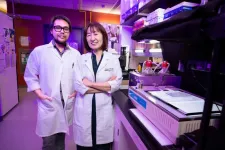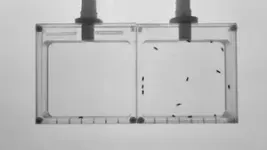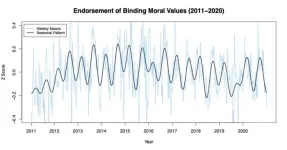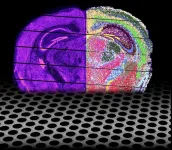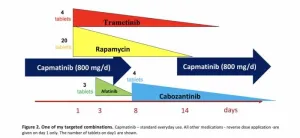(Press-News.org) EL PASO, Texas (Aug. 6, 2024) – Grab a drink with friends at happy hour and you’re likely to feel chatty, friendly and upbeat. But grab a drink alone and you may experience feelings of depression. Researchers think they now know why this happens.
“Social settings influence how individuals react to alcohol, yet there is no mechanistic study on how and why this occurs,” said Kyung-An Han, Ph.D., a biologist at The University of Texas at El Paso who uses fruit flies to study alcoholism.
Now, Han and a team of UTEP faculty and students have taken a key step in understanding the neurobiological process behind social drinking and how it boosts feelings of euphoria. Their new study, published in a recent issue of the journal Addiction Biology, pinpoints the region of the brain that is stimulated by social drinking and may lead to a better understanding of how humans become vulnerable to Alcohol Use Disorder (AUD), a disease that affected nearly 29.5 million people just this past year, according to the National Institute on Alcohol Abuse and Alcoholism.
Turns out that tipsy fruit flies aren’t that different from intoxicated humans. Although they might seem like an unconventional choice from which to derive knowledge about human behavior, these insects share about 75% of the same genes that cause human diseases, Han explained.
Using fruit flies, Han and her team sought to demonstrate that ethanol, the alcohol in drinks, causes different reactions in solitary versus group settings and that dopamine, the brain molecule that plays a role in pleasure, motivation and learning, is a key player for this phenomenon.
The team’s experiments consisted of exposing fruit flies, either alone or in a group setting, to ethanol vapor and measuring their average speed to determine the degree of ethanol-induced response. While flies who “drank alone” displayed a slight increase in movement, flies exposed to ethanol in a group setting displayed significantly increased speed and movement.
The team then proceeded to test whether dopamine plays a role in the flies’ response to ethanol, comparing a control group whose dopamine was naturally regulated by the brain with an experimental group that had increased levels of dopamine.
The team found that the flies, regardless of whether they had normal or increased levels of dopamine, had a similar reaction to ethanol in a solitary setting — a tiny increase in activity. But in social settings, the flies with increased dopamine showed even more heightened hyperactivity than usual.
“We demonstrated that both social settings and dopamine act together for the flies’ heightened response to ethanol,” said Han who currently serves as associate dean in the College of Science.
The team’s final task was to identify which of the five dopamine receptors in the brain is the largest contributor in this process and found that the D1 dopamine receptor was most important to flies’ reaction to ethanol in a social setting.
“The human D1 receptor gene is linked to Alcohol Use Disorder and this study provides experimental validation for it. For the team, the identification of the D1 receptor is crucial as it gives researchers at UTEP and beyond a blueprint for follow up studies,” Han explained.
“Our work is providing scientific knowledge to support the idea that the brain interprets and processes a person’s social surrounding and has that signal converge into the dopamine system that is also activated by alcohol consumption,” said Paul Rafael Sabandal, Ph.D., a research assistant professor in biological sciences and one of the study’s corresponding authors. “It gives us as researchers an idea of which brain area and components may serve as the meeting point for all the signals that contribute to AUD.”
The team’s next step is to explore the intricacies by which the D1 dopamine receptor serves as the nexus point for the signals that contribute to the ethanol, social interaction and AUD.
Han said, “The opportunity to work on projects whose positive impact can be applied at scale is one of the reasons I became a scientist. It’s humbling to know that our work has the potential to help people live better lives and our team is going to continue striving toward achieving that goal.”
Additional study authors are former UTEP undergraduates Dilean Murillo Gonzalez and Bryan Hernandez Granados, who are now at the Baylor College of Medicine Neuroscience Graduate Program and the Vanderbilt University Postbaccalaureate Program, respectively.
The research was funded by UTEP’s Orville Edward Egbert, M.D. Endowment fund.
About The University of Texas at El Paso
The University of Texas at El Paso is America’s leading Hispanic-serving university. Located at the westernmost tip of Texas, where three states and two countries converge along the Rio Grande, 84% of our 24,000 students are Hispanic, and more than half are the first in their families to go to college. UTEP offers 170 bachelor’s, master’s and doctoral degree programs at the only open-access, top-tier research university in America.
END
What happens to your brain when you drink with friends?
Using fruit flies, UTEP study shows how social drinking boosts euphoria
2024-08-06
ELSE PRESS RELEASES FROM THIS DATE:
University of Houston researchers create new treatment and vaccine for flu and various coronaviruses
2024-08-06
A team of researchers, led by the University of Houston, has discovered two new ways of preventing and treating respiratory viruses. In back-to-back papers in Nature Communications, the team - from the lab of Navin Varadarajan, M.D. Anderson Professor of William A. Brookshire Chemical and Biomolecular Engineering - reports the development and validation of NanoSTING, a nasal spray, as a broad-spectrum immune activator for controlling infection against multiple respiratory viruses; and the development of NanoSTING-SN, a pan-coronavirus nasal vaccine, that can protect against infection and disease by all members of the coronavirus family.
NanoSTING ...
People's moral values change with the seasons
2024-08-06
A new UBC study has revealed regular seasonal shifts in people’s moral values.
The finding has potential implications for politics, law and health—including the timing of elections and court cases, as well as public response to a health crisis.
The research published this week in Proceedings of the National Academy of Sciences (PNAS) analyzed survey responses from more than 230,000 people in the U.S. over 10 years and revealed that people’s embrace of certain moral ...
Researchers reveal atomic-scale details of catalysts’ active sites
2024-08-06
The chemical and energy industries depend upon catalysts to drive the reactions used to create their products. Many important reactions use heterogeneous catalysts — meaning that the catalysts are in a different phase of matter than the substances they are reacting with, such as solid platinum reacting with gases in an automobile’s catalytic converter.
Scientists have investigated the surface of well-defined single crystals, illuminating the mechanisms underlying many chemical reactions. However, there is much more to be learned. For heterogeneous catalysts, their 3D atomic structure, their chemical composition and the nature of ...
The prescription for a healthier democracy
2024-08-06
When we’re sick, the first step on the road to recovery is a visit to the doctor’s office.
It turns out the same may also be true for breathing life into America’s democracy.
A Rutgers University–New Brunswick study published in the journal JAMA Health Forum finds that physicians can play a crucial role in strengthening political inclusion of marginalized groups by aiding patients in voter registration.
“Hospitals aren’t the first place we think of when it comes to voter registration,” said Katherine McCabe, an associate professor of American politics at Rutgers University-New Brunswick and lead ...
New substrate material for flexible electronics could help combat e-waste
2024-08-06
Electronic waste, or e-waste, is a rapidly growing global problem, and it’s expected to worsen with the production of new kinds of flexible electronics for robotics, wearable devices, health monitors, and other new applications, including single-use devices.
A new kind of flexible substrate material developed at MIT, the University of Utah, and Meta has the potential to enable not only the recycling of materials and components at the end of a device’s useful life, but also the scalable manufacture of more ...
Johns Hopkins Medicine scientists probe molecular cause of COVID-19 related diarrhea, revealing potential treatments
2024-08-06
Working with human stem cells that form a kind of “mini intestine-in-a-dish,” Johns Hopkins Medicine scientists say they have found several molecular mechanisms for COVID-19-related diarrhea, suggesting potential ways to control it.
Details of the experiments in a model of human intestinal tissue, called enteroids, are described on July 30 in Cellular and Molecular Gastroenterology and Hepatology.
Along with the unpleasant aches, fever, sore throat, cough, respiratory distress and other symptoms that may accompany COVID-19 infection, up to half of people who get the virus will experience diarrhea. Some 30% of them will go on to develop ...
New open-source platform for high-resolution spatial transcriptomics
2024-08-06
Leuven, 6 August 2024 - A team of researchers from the lab of Prof. Stein Aerts (VIB-KU Leuven) presents Nova-ST, a new spatial transcriptomics technique that promises to transform gene expression profiling in tissue samples. Nova-ST will make large-scale, high-resolution spatial tissue analysis more accessible and affordable, offering significant benefits for researchers. The research was published in Cell Reports Methods.
Transcriptomics is the study of gene expression in a cell or a population of cells, but it usually does not include spatial information about where those genes were active. This hurdle limited our understanding of complex ...
Targeted cancer therapy: initial high concentration may slow down selection for resistance
2024-08-06
BUFFALO, NY- August 6, 2024 – On July 28, 2024, Mikhail V. Blagosklonny M.D., Ph.D., from Roswell Park Comprehensive Cancer Center published a new editorial in Volume 16, Issue 14 of Aging (listed by MEDLINE/PubMed as "Aging (Albany NY)" and "Aging-US" by Web of Science), entitled, “Targeted cancer therapy: the initial high concentration may slow down the selection for resistance.”
“Unfortunately, any targeted therapy is, always, started with low levels of the drug in the organism, selecting for drug resistance. One should propose that initial drug levels must be maximized, ...
Lehigh University researchers dig deeper into stability challenges of nuclear fusion—with mayonnaise
2024-08-06
Mayonnaise continues to help researchers better understand the physics behind nuclear fusion.
“We’re still working on the same problem, which is the structural integrity of fusion capsules used in inertial confinement fusion, and Hellmann’s Real Mayonnaise is still helping us in the search for solutions,” says Arindam Banerjee, the Paul B. Reinhold Professor of Mechanical Engineering and Mechanics at Lehigh University and Chair of the MEM department in the P.C. Rossin College of Engineering and Applied Science.
In simple terms, fusion reactions are what power the sun. If the process could ...
Texas Tech professor receives grant for printable semiconductors research
2024-08-06
Minxiang “Glenn” Zeng, an assistant professor in the Department of Chemical Engineering at Texas Tech University, has been awarded a $250,000 grant from the Launching Early-Career Academic Pathways in the Mathematical and Physical Sciences (LEAPS-MPS) award from the National Science Foundation (NSF) to further his research about printable semiconductors and electronics under extreme environments.
The grant supports Zeng’s work in understanding and controlling the thermal degradation pathways of printed metal chalcogenides, which are semiconductor materials including selenides, tellurides and sulfides. His goal is to develop strategies to enhance the thermal stability ...
LAST 30 PRESS RELEASES:
Transient Pauli blocking for broadband ultrafast optical switching
Political polarization can spur CO2 emissions, stymie climate action
Researchers develop new strategy for improving inverted perovskite solar cells
Yes! The role of YAP and CTGF as potential therapeutic targets for preventing severe liver disease
Pancreatic cancer may begin hiding from the immune system earlier than we thought
Robotic wing inspired by nature delivers leap in underwater stability
A clinical reveals that aniridia causes a progressive loss of corneal sensitivity
Fossil amber reveals the secret lives of Cretaceous ants
Predicting extreme rainfall through novel spatial modeling
The Lancet: First-ever in-utero stem cell therapy for fetal spina bifida repair is safe, study finds
Nanoplastics can interact with Salmonella to affect food safety, study shows
Eric Moore, M.D., elected to Mayo Clinic Board of Trustees
NYU named “research powerhouse” in new analysis
New polymer materials may offer breakthrough solution for hard-to-remove PFAS in water
Biochar can either curb or boost greenhouse gas emissions depending on soil conditions, new study finds
Nanobiochar emerges as a next generation solution for cleaner water, healthier soils, and resilient ecosystems
Study finds more parents saying ‘No’ to vitamin K, putting babies’ brains at risk
Scientists develop new gut health measure that tracks disease
Rice gene discovery could cut fertiliser use while protecting yields
Jumping ‘DNA parasites’ linked to early stages of tumour formation
Ultra-sensitive CAR T cells provide potential strategy to treat solid tumors
Early Neanderthal-Human interbreeding was strongly sex biased
North American bird declines are widespread and accelerating in agricultural hotspots
Researchers recommend strategies for improved genetic privacy legislation
How birds achieve sweet success
More sensitive cell therapy may be a HIT against solid cancers
Scientists map how aging reshapes cells across the entire mammalian body
Hotspots of accelerated bird decline linked to agricultural activity
How ancient attraction shaped the human genome
NJIT faculty named Senior Members of the National Academy of Inventors
[Press-News.org] What happens to your brain when you drink with friends?Using fruit flies, UTEP study shows how social drinking boosts euphoria
